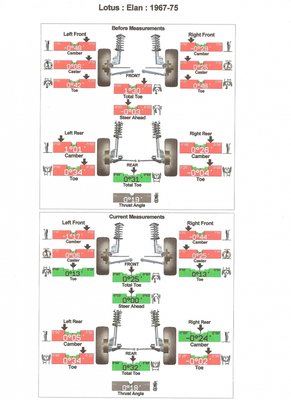Re: alignment
I once had a Triumph Spitfire that had little self centring and then the bottom snapped off the upright. Grease had been used in the trunnions and set hard giving no lubrication, hence lots of friction and no self centring. The Elan +2 uses the same bits.
I doubt the chassis is wrong and something major would be required for the castor to be way out. I would start with the obvious, as someone else has suggested, and strip and service the trunnions, then check the steering rack is not binding.
I doubt the chassis is wrong and something major would be required for the castor to be way out. I would start with the obvious, as someone else has suggested, and strip and service the trunnions, then check the steering rack is not binding.
